2012中考复习之非谓语动词
图片预览

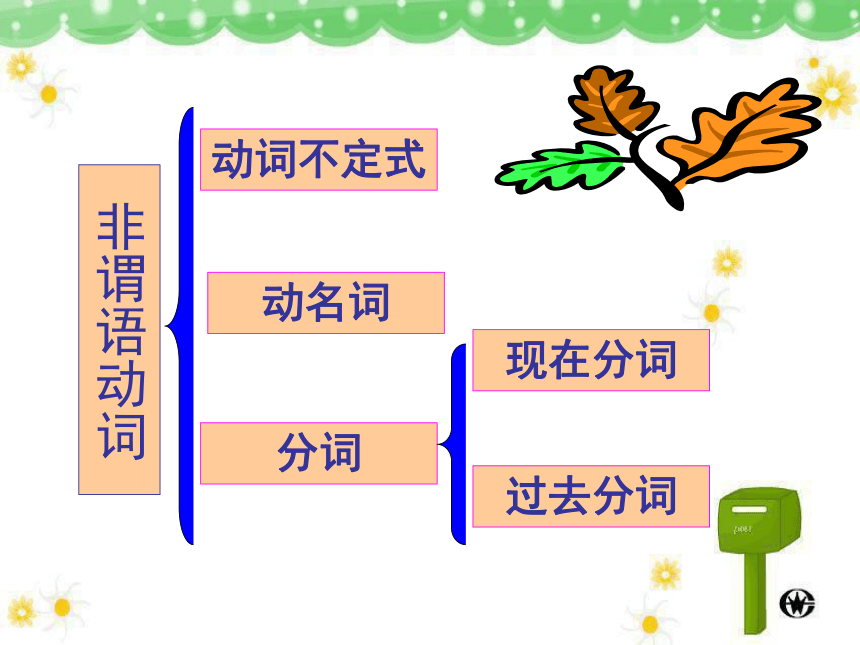
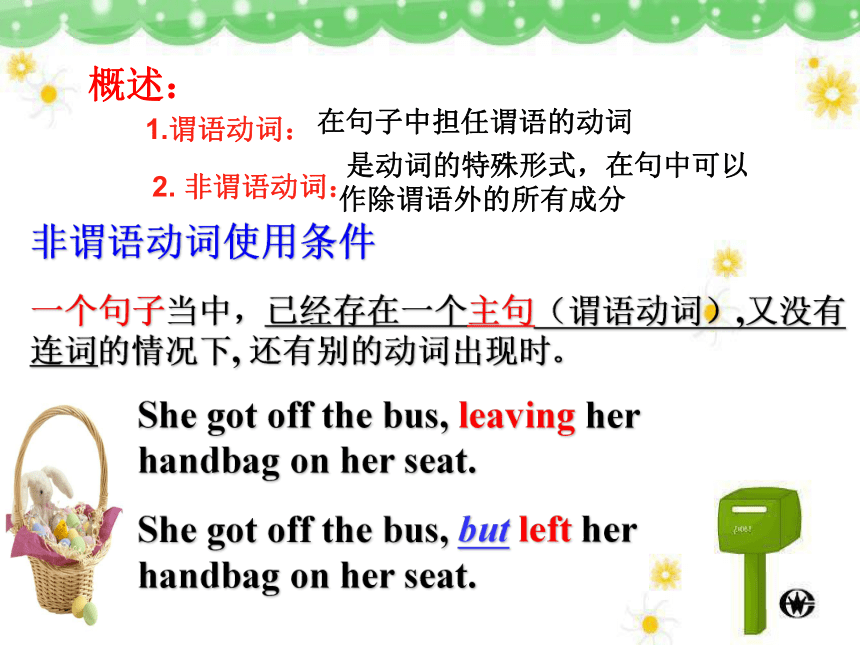
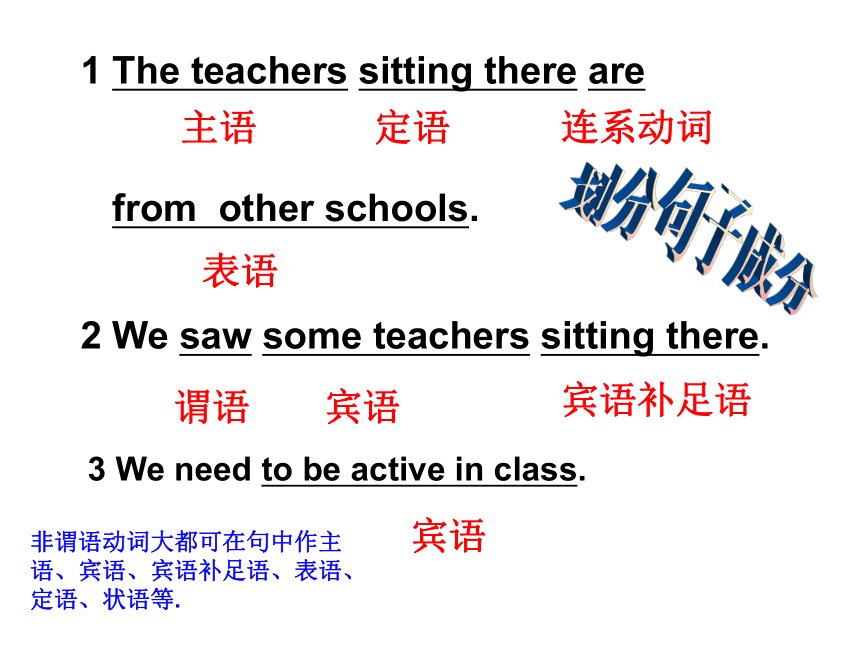
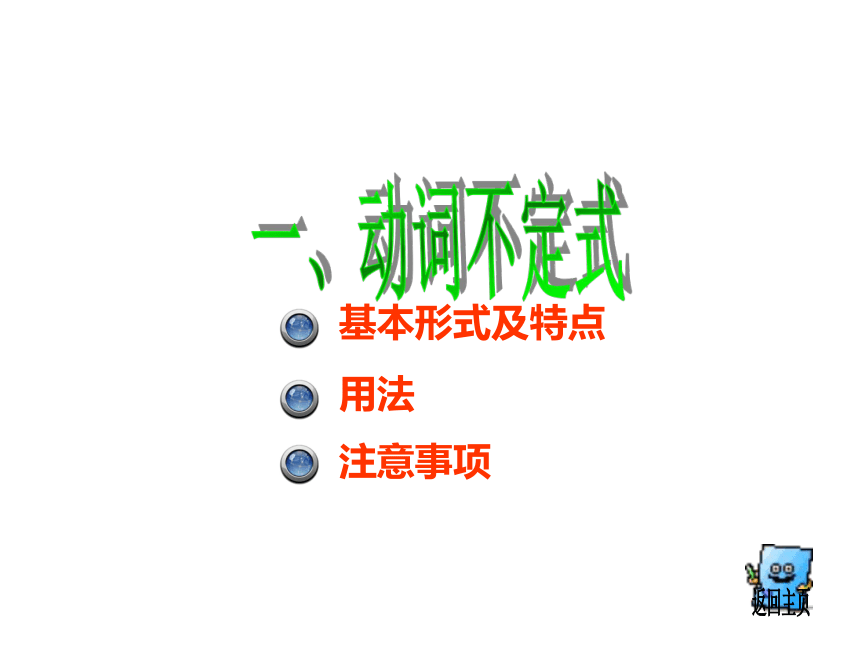
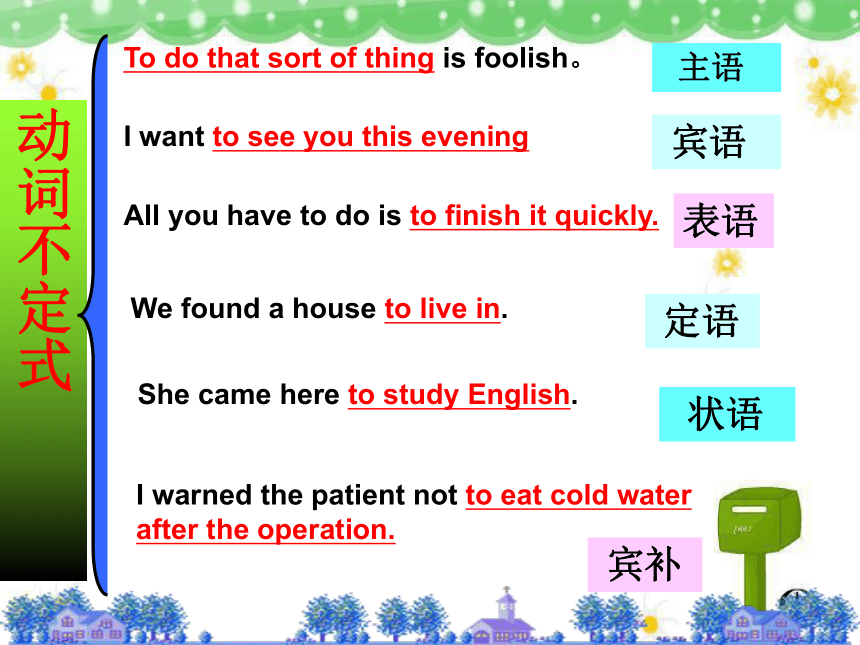
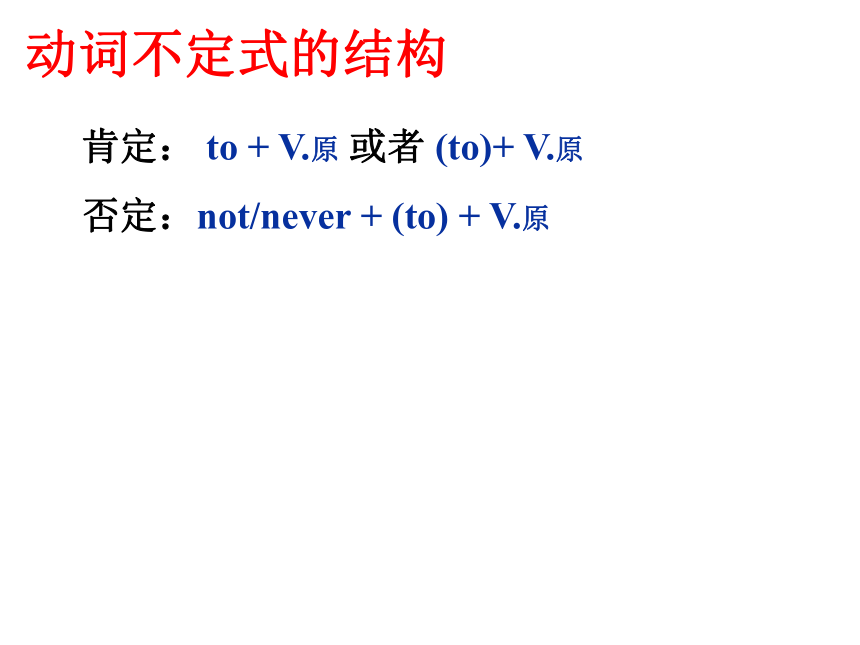
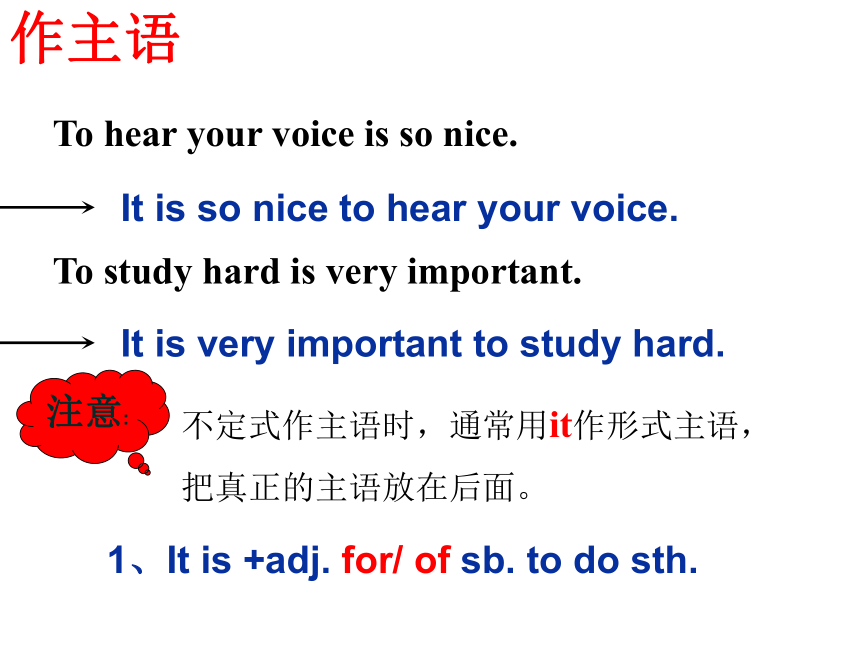
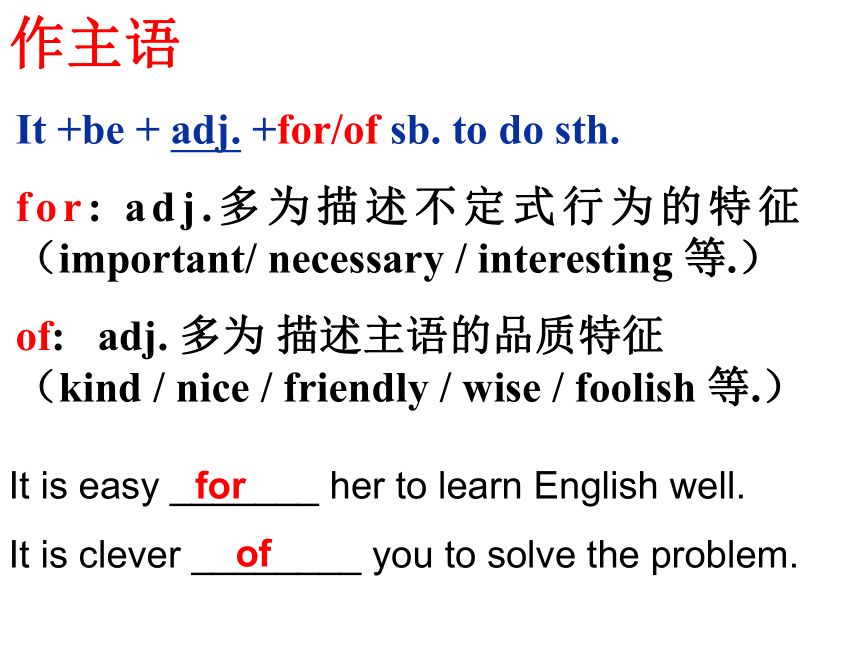
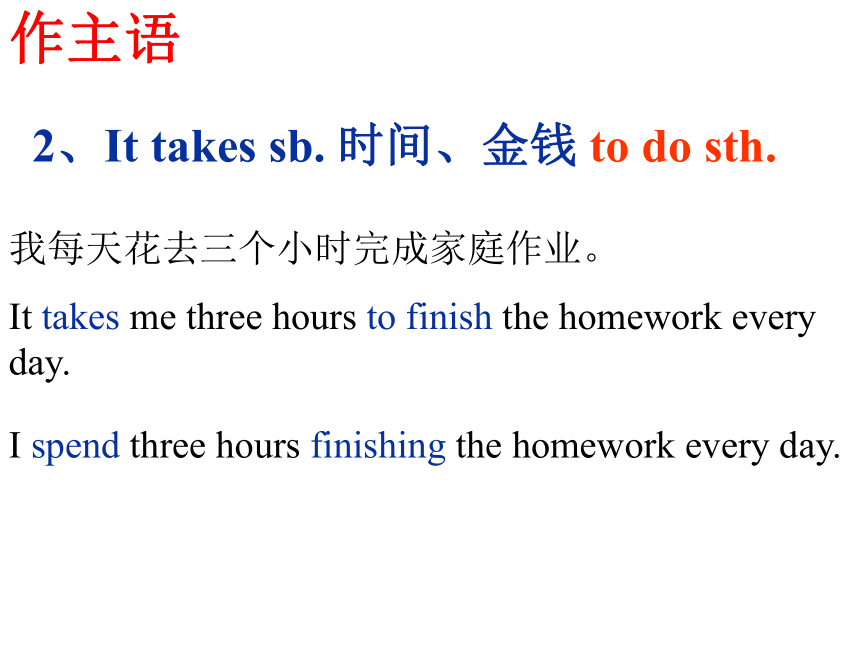
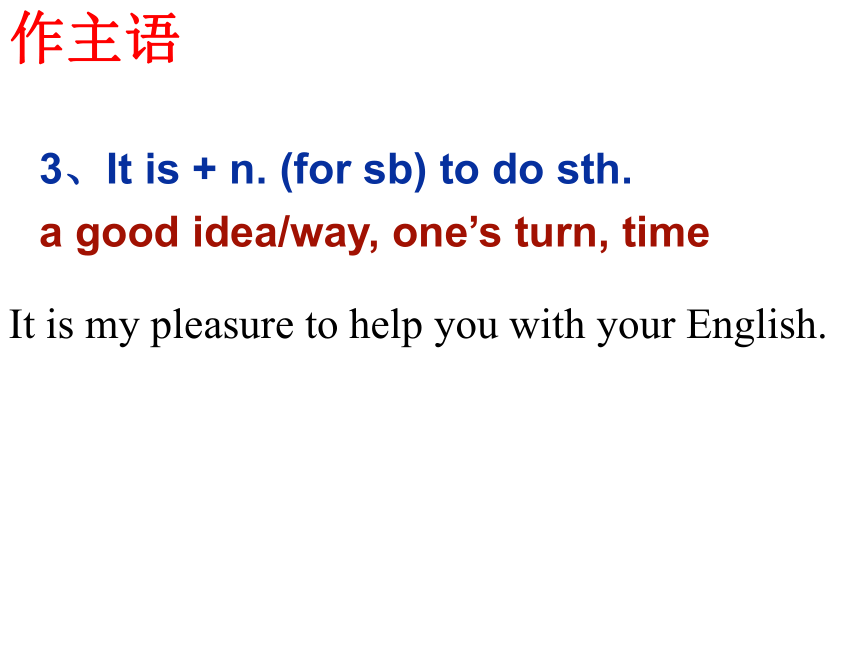

文档简介
(共70张PPT)
非谓语动词讲解
Nonfinite Verbs
非谓语动词
动名词
分词
现在分词
过去分词
动词不定式
1.谓语动词:
概述:
2. 非谓语动词:
在句子中担任谓语的动词
是动词的特殊形式,在句中可以作除谓语外的所有成分
一个句子当中,已经存在一个主句(谓语动词),又没有连词的情况下, 还有别的动词出现时。
非谓语动词使用条件
She got off the bus, leaving her handbag on her seat.
She got off the bus, but left her handbag on her seat.
1 The teachers sitting there are
from other schools.
表语
2 We saw some teachers sitting there.
宾语补足语
3 We need to be active in class.
宾语
谓语
宾语
主语
定语
连系动词
非谓语动词大都可在句中作主语、宾语、宾语补足语、表语、定语、状语等.
基本形式及特点
用法
注意事项
动词不定式
To do that sort of thing is foolish。
I want to see you this evening
All you have to do is to finish it quickly.
We found a house to live in.
She came here to study English.
I warned the patient not to eat cold water after the operation.
主语
宾语
表语
定语
状语
宾补
肯定: to + V.原 或者 (to)+ V.原
否定:not/never + (to) + V.原
动词不定式的结构
作主语
To hear your voice is so nice.
To study hard is very important.
It is so nice to hear your voice.
It is very important to study hard.
不定式作主语时,通常用it作形式主语,
把真正的主语放在后面。
注意:
1、It is +adj. for/ of sb. to do sth.
It +be + adj. +for/of sb. to do sth.
for: adj.多为描述不定式行为的特征 (important/ necessary / interesting 等.)
of: adj. 多为 描述主语的品质特征 (kind / nice / friendly / wise / foolish 等.)
作主语
It is easy _______ her to learn English well.
It is clever ________ you to solve the problem.
of
for
2、It takes sb. 时间、金钱 to do sth.
It takes me three hours to finish the homework every day.
作主语
我每天花去三个小时完成家庭作业。
I spend three hours finishing the homework every day.
3、It is + n. (for sb) to do sth.
a good idea/way, one’s turn, time
It is my pleasure to help you with your English.
作主语
4、用在谚语中
To see is to believe.
To say is easy, but to do is hard.
作主语
1、It is necessary ______us to learn to wait.
(of/for)
2、It was careless ______me to break the cup .
(of/for)
3、It took them 1,000 yuan _________this
table. (buy)
4、It is my pleasure _________ the box for you.
(carry)
to buy
for
of
to carry
练习
5、轮到我们打扫教室了。
It is our turn_________________________
6、To waste time is to shorten life. (翻译成中文)
to clean the classroom.
浪费时间就是缩短生命。
练习
1、动词+ to do sth.
常用动词有:
want / wish / like / would like / expect/hope / plan / try / decide / learn / need / agree / begin / start / forget / remember / manage / seem / fail/ refuse/ promise/happen等
1、I hope to finish it tomorrow .
2、She plans to go and teach in the country.
作宾语
2、动词+疑问词+to do
I don’t know____________ next.
She can’t decide_________________.
作宾语
2、她不能决定买哪本书。
1、我不知道接下来该做什么。
what to do
which book to buy
=She can’t decide which book she should buy.
3.I asked him how I could learn English well.
I asked him how to learn English well
4.I don’t know whether I should see him or not.
I don’t know whether to see him or not.
1、Don’t forget _________________.(关灯)
2、I happened ________when he called me. (出去)
3、I don’t want________________. (依赖别人)
4、Sam is learning________________. (怎样开车)
5、We promise __________ the environment.(保护)
to turn off the light
to go out
to depend on others
how to drive a car
练习
to protect
1、动词 + 宾语(sb./sth.) + to do sth.
1、The teacher asked her to answer the question.
2、The doctor told me to have a good rest.
作宾补-对宾语进行补充说明
常用动词有:ask, tell, allow, want, teach, invite, choose, wish, encourage, would like 等
动词多为感官动词、使动词。
一感:feel
二听:hear, listen to
三使:make, let, have
五看:see, notice, watch, look at, find
John’s mother makes him play the piano every day.
被动:
John _________ play the piano every day.
is made to
2、动词+宾语+不带to的不定式
动词help之后的不定式既可省to也可不省to。
He often helps the room. (clean)
Mr. Zhang always helps us _________ _ English. (learn)
注意:感官动词、使役动词后不定式省to,但变为被动语态时,必须加上to。
They are made for 12 hours a day. (work)
He was seen up the tree. (climb)
( ) A robber was seen ______ the bank.
A. enter B to enter C. entered
思考
B
to work
to climb
to clean /clean
to learn/learn
比较:
看见某人做过/经常做某事
看见某人正在做某事
see sb.do sth.
see sb. doing sth.
1. When I turned back, I saw him .
A. talk B. talking C. to talk
B
2. Don’t worry, I saw your son the bus.
A. get on B. to get on C. getting on
A
A
e.g. People saw the robber a car .
(get into)
I saw Mom when I got home. (cook)
注意
填空:
I heard him _______ (sing ) when I walked past his room.
‘ Help! Help! I saw a boy_____ (fall) into the river just now.'
singing
fall
get into
cooking
1、Let him _______ the work at once.
(finish / to finish)
2、Do you like listening to other people______
(talk / talking/to talk )
3、Jim was seen _________the room.
(enter /to enter )
4、Please tell her _________here on time .
(come / to come)
finish
talk
to enter
to come
练习
5、I’ll help you _________this problem.
(to solve /solve )
6、 I wish you will stay with us.(改成简单句)
7、Her story made us laugh. (改成被动句)
(to ) solve
I wish you to stay with us.
We were made to laugh by her story.
1、主语 + be + to do sth
主语多为 duty / wish / hope / idea / plan / ambition/ dream / work / job 等 名词
1、My ambition is to be a singer.
2、His work is to clean the classroom every day.
作表语
我的梦想是成为一名歌手。
他的工作是每天清扫教室。
2、谚语中
1、To know everything is to know nothing.
2、To see is to believe.
放在被修饰词的后面(time, chance,way,place,something to do sth)
I have a lot of work to do.
I want to find something to drink.
作定语
不定式为不及物动词时后面应有必要的介词。
I’m looking for a hotel _________.
A. stay B. stay at C. to stay D. to stay at
D
位置:
He hasn’t got a house to live_____.
I have no pens to write _______.
in
with
1、原因状语:
主语 + be + adj.(表情感) + to do sth.
(happy/ glad angry / sorry / sad /afraid 等)
I’m sorry to hear that.
作状语
I’m glad to see you.
2、目的状语 (主语+ do A to do B)
The soldier ran into the room to save the girl .
_____ ____ the soldier run into the room
Why did
Many parents send their children abroad ___________________.(深造学习)
to further their studies
3、结果状语
too + adj./adv. +to do sth. 太…而不能
adj./adv. enough to do sth.
You are too young to do this job.
He ran fast enough to catch the bus.
1.see/ hear/ feel/ notice/ look at /listen to/find sb. do sth. 看见/听见/感觉/注意某人作某事
make /let /have sb. do sth. 使/让某人做某事 (被动+to)
2、help sb. (to) do sth/ with sth.帮助某人作某事
3、 had better (not) do sth. 最好(不)做某事
4、 Why don’t you/ not do sth.为什么不作某事
5、Would /Will / Could you please (not) do sth.
请你(不)作某事好吗
6. Would rather do A than do B
7. rather than do
8、prefer to do sth. rather than do sth.
宁愿作某事,而不愿作某事
省略动词不定式的短语
一、常使用动词不定式的短语
1、It’s time to do sth.\ It’s time for sth
该作某事的时候了.
2、can’t wait to do sth. 迫不及待要作某事
3、be supposed to do sth=should do sth. 应该作某事
4、have sth/nothing to do with 有…时要做/与…无关
5、find it +adj. to do sth. 发觉作某事…
6、It’s better /best to do sth. 最好做某事
中考重点句型
too…to do sth. 太…而不能…
so +adj. /adv + that(从句) 如此…以致…
such +(a/an +adj.)+n.+ that(从句)
如此…以致…
(not) enough (for sb.) to do sth.
(对某人来说)做某事(不)够
eg. The boy is too young to go to school.
The boy is so young that he can’t go to school.
He is such a young boy that he can’t go to school.
The boy is not old enough to go to school.
同义词比较
1. He came here _______(visit)his teacher .
2.I refuse ___________ (answer) any of your questions.
3.Mary decided __________ (not buy) the house.
4. The program was boring. It made me _____ (fall) asleep.
5.I am looking forward to _________ (hear) from you.
6.He was seen ____________ (get) into the room.
7.I saw my teacher _______ (wait) for the bus when I passed the bus stop.
8. Could you help me_____________ (carry) the bag
一. 用所给词的适当形式填空:
to visit
to answer
not to buy
fall
hearing
to get
waiting
carry/to carry
小结:
1.什么叫动词不定式
2. 动词不定式的否定
3. 省 to 的动词不定式
to + 动词原形
not to + v
feel, hear, listen to, let, make, have,
watch, look at, see, notice
基本形式及特征
用法
注意
基本形式
特点
动词原形 + ing
1、具有名词、动词的一些特征。
2、有时态和语态的变化
动词+doing
介词+doing
doing
动名词
用法
1、作主语
Picking apples is much better than having classes.
2、作宾语
(1)只能接动名词做宾语的动词有miss, finish, mind, keep, practice, enjoy, suggest, avoid, regret等。
3、作表语
His favorite sport is playing basketball .
4、作定语
shopping basketball finishing line
(2)既可接动词不定式又可接动名词作宾语的动词有两类:
意义区分不大:begin , start, like, love, hate, prefer 等。
意义不同:remember, forget, stop, go on , try 等
begin , start
+
to do sth.
doing sth.
III.
like , love, hate
+
to do sth.
doing sth.
A:无差别
B:有一定差别
C:差别很大
动词 + to do sth.(未做) +doing sth.(已做)
remember 记得要做某事 记得曾做某事
forget 忘记做某事 忘记做了某事
stop 停下来去做另一事 停止正做的事
try 尽力去做某事 尝试做某事
Eg.
A: begin , start
They bging to about it.
他们开始谈论这事。
talk /talking
They started to on the machine.
work/working
他们开始操作机器。
B: like , love , hate
He likes to music.
他喜欢听音乐。
He hates to Happy Birthday.
他讨厌听《生日快乐》。
listening
to listen
Eg. C:
She tried a composition.
她试着写作文。
writing
她设法(尽力)打电话给你。
She tried you .
to call
I remember the door just now.
我记得我刚才开了门。
opening
Please remember the door after work.
to close
请记住下班后关门。
I forgot him the news.
我忘记已经告诉他这个消息了。
I forgot him the news .
to tell
我忘记了告诉他这个消息。
telling
Go on doing sth./ go on to do sth.
go on doing sth /with sth.“继续做同一件事”,它可以指不中断的继续,也可以指暂停后的继续,但均指同一事情的延续。E.g.After a while he went on writing the letter.
go on to do sth. “停下某事,接着做另一件事”e.g.The teacher said , “Have a rest and then go on to do Exercise 4.
Be going cheap廉价出售一睐
Keep on doing sth./ keep doing sth/keep sb doing .
Keep on doing sth.
继续做某事(指继续做先前停下来的事情)
E.g.Lucy kept on doing homework after supper.
Keep doing sth.一直不断地做某事
E.g.Farmers kept working though it was raining hard.
尽管天下大雨,农民们继续干活。
He kept me running.
used to do sth. 过去常常作某事
be used to do sth. 被用来作某事
be used to doing sth. 习惯于作某事
eg. My father used to smoke.
Wood is used to make paper.
I am used to getting up early.
mean to do sth 打算做
mean doing sth 意味着做
Sth.need to be done=
Sth. need doing sth
1.The bike needs reparing.
2.The bike needs to be repared.
sb. need to do sth.
I need to learn the poem by heart.
1、动名词的 复合结构为:
名词所有格
形容词性物主代词
+ 动名词
Do you mind _________the window
me to open b. I open
c.my opening d. me opening
c
2、动名词的习惯用语:
a. It’s no use doing sth.
b. can’t help doing sth.
c. feel like doing sth.
d. be busy doing sth.
e. No doing
f. Have fun /problems/difficulty (in )doing
此to 非彼to
look forward to doing sth. (盼望)
pay attention to doing sth. (注意)
be/get used to doing sth. (习惯于)
prefer doing sth to doing sth.(更喜欢)
give one’s life to doing sth (献身于)
make a contribution to doing (做贡献)
只能接-ing作宾语的动词口诀:
喜欢花费忙着想象忍不住想要结束练习 错过建议保持介意值得考虑 (押韵)
喜欢花费忙着想象忍不住想要结束练习
enjoy doing sth. 喜欢做某事
spend...doing sth. 花费…做某事
be busy doing sth. 忙于做…
imagine doing sth. 想象…做某事
can't help doing sth. 忍不住做某事
feel like doing sth. 想要做某事
finish doing sth. 完成做某事
practice doing sth. 练习做某事
miss doing sth. 错过做某事
suggest doing sth. 建议做某事
keep (on) doing sth. 保持(继续)做某事
mind doing sth. 介意做某事
be worth doing sth. 值得做某事
consider doing sth. 考虑做某事
错过建议保持介意值得考虑
介词+doing
常考介词:
at, in, on
of, off, for, from
up, about, without
to 等等
be good at doing sth 擅长做某事
be interested in doing sth. 对做某事感兴趣
insist on doing 坚持做某事
be used for doing sth. 被用来做某事
thank sb. for doing sth. 谢谢某人做某事
be tired of doing sth. 厌烦做某事
be afraid of doing sth. 害怕做某事
put off doing 推迟做某事
stop sb. from doing sth. 阻止某人做某事
give up doing sth. 放弃做某事
without doing sth. 没有做某事
think about doing sth. 考虑做某事
What ∕ How about doing 做某事怎么样
三、分词:Participles
一 分词的概述
1. 分词是“非谓语动词”的另一种形式,它有两种形式:现 在分词(Present Participle)和过去分词(Past Participle)。
2. 现在分词:doing
过去分词:规则动词 V+ed
不规则动词
3.分词在句中起形容词和副词的作用。在句中 作表语、定语状语和宾语补足语。
现在分词与过去分词的区别:
1.语态上:现在分词表主动,过去分词表被动
Do you know the woman talking to Tom
The soldier wounded in the war has become a doctor.
2. 时态上:现在分词表进行,过去分词表完成
Developing country boiling water
Developed country boiled water
The bridge built last month needs repairing.
上个月建造的那座桥需要修理。
(3)分词短语作定语必须置于被修饰词之后, 相当于一个定语从句。如:
Those who wish to join the club should sign here
(Those wishing to join this club should sign here.
)
想加入本俱乐部的人在这里签名。
The man, who had been disturbed so badly, almost lost his memory.)
由于被严重困扰,这个人几乎失去了记忆。
(The man, having been disturbed so badly, almost lost his memory.
(4)过去分词作定语在意义上有两种可能:表示被动和完成,只表完成。如:
the question discussed yesterday
昨天讨论的问题 (既表示被动也表示完成)
the fallen leaves
落下的树叶 (只表示完成,不表示被动)
2、作表语
分词作表语表示主语的某种性质或状态。如:
She was too frightened to move.
她被吓得一动不动。
What you said is really inspiring.
你所说的真令从鼓舞。
3、作宾语补足语
可以跟宾语补足语的谓语动词有 see, watch, hear, set, keep, find, have, get 等词。
I saw him walking in the street.
我看见他在街上走。
I heard them singing in the classroom.
我听见他们在教室里唱歌。
We found the boy sleeping.
我们发现小孩睡着了。
A)I heard my brother ( singing , sung ) in the next room
B)I heard the song ( singing , sung ) in English .
现在分词与过去分词在作状语的区别
四、作状语
现在分词表主动进行,过去分词表被动完成
1. (Seeing/seen) from the top of the tower, we can see a beautiful factory.
(Seeing/seen) from the top of the tower, the factory looks beautiful.
2. (Hearing/heard) the bad news, they couldn’t help crying.
3. (Giving/Given) more time, we could do it better.
4.I stood by the door, not daring to say a word.
一、选择
1. He has promised better latter.
A. behaving B. behave C. to behave
2. He hated her.
A. trouble B. to troubling C. to trouble
3. He stopped when the teacher came in.
A. to talk B. talking C. talked
4. I have finished the room.
A. clean B. to read it C. cleaning
5. I give you a book .
A. to read B. to read it C. reading it
6. There is nothing for us .
A. to worry B. to worry about C. worrying about
C
C
B
C
A
B
二、改错
1. One day a cat hold a mouse and wanted eating it.
2. I enjoy listening foreign music.
3. The workers were made work day and night.
4. Please let me to get out of this dirty place.
( to eat )
( to )
( to )
5. At last he agreed stay here.
6. After they got to the top of the mountain , they
stopped having a rest.
7. She would like staying at home on Sundays.
8. I told the boy don’t to tie the dog under the tree.
( to )
( to have )
( to stay )
( not )
非谓语动词讲解
Nonfinite Verbs
非谓语动词
动名词
分词
现在分词
过去分词
动词不定式
1.谓语动词:
概述:
2. 非谓语动词:
在句子中担任谓语的动词
是动词的特殊形式,在句中可以作除谓语外的所有成分
一个句子当中,已经存在一个主句(谓语动词),又没有连词的情况下, 还有别的动词出现时。
非谓语动词使用条件
She got off the bus, leaving her handbag on her seat.
She got off the bus, but left her handbag on her seat.
1 The teachers sitting there are
from other schools.
表语
2 We saw some teachers sitting there.
宾语补足语
3 We need to be active in class.
宾语
谓语
宾语
主语
定语
连系动词
非谓语动词大都可在句中作主语、宾语、宾语补足语、表语、定语、状语等.
基本形式及特点
用法
注意事项
动词不定式
To do that sort of thing is foolish。
I want to see you this evening
All you have to do is to finish it quickly.
We found a house to live in.
She came here to study English.
I warned the patient not to eat cold water after the operation.
主语
宾语
表语
定语
状语
宾补
肯定: to + V.原 或者 (to)+ V.原
否定:not/never + (to) + V.原
动词不定式的结构
作主语
To hear your voice is so nice.
To study hard is very important.
It is so nice to hear your voice.
It is very important to study hard.
不定式作主语时,通常用it作形式主语,
把真正的主语放在后面。
注意:
1、It is +adj. for/ of sb. to do sth.
It +be + adj. +for/of sb. to do sth.
for: adj.多为描述不定式行为的特征 (important/ necessary / interesting 等.)
of: adj. 多为 描述主语的品质特征 (kind / nice / friendly / wise / foolish 等.)
作主语
It is easy _______ her to learn English well.
It is clever ________ you to solve the problem.
of
for
2、It takes sb. 时间、金钱 to do sth.
It takes me three hours to finish the homework every day.
作主语
我每天花去三个小时完成家庭作业。
I spend three hours finishing the homework every day.
3、It is + n. (for sb) to do sth.
a good idea/way, one’s turn, time
It is my pleasure to help you with your English.
作主语
4、用在谚语中
To see is to believe.
To say is easy, but to do is hard.
作主语
1、It is necessary ______us to learn to wait.
(of/for)
2、It was careless ______me to break the cup .
(of/for)
3、It took them 1,000 yuan _________this
table. (buy)
4、It is my pleasure _________ the box for you.
(carry)
to buy
for
of
to carry
练习
5、轮到我们打扫教室了。
It is our turn_________________________
6、To waste time is to shorten life. (翻译成中文)
to clean the classroom.
浪费时间就是缩短生命。
练习
1、动词+ to do sth.
常用动词有:
want / wish / like / would like / expect/hope / plan / try / decide / learn / need / agree / begin / start / forget / remember / manage / seem / fail/ refuse/ promise/happen等
1、I hope to finish it tomorrow .
2、She plans to go and teach in the country.
作宾语
2、动词+疑问词+to do
I don’t know____________ next.
She can’t decide_________________.
作宾语
2、她不能决定买哪本书。
1、我不知道接下来该做什么。
what to do
which book to buy
=She can’t decide which book she should buy.
3.I asked him how I could learn English well.
I asked him how to learn English well
4.I don’t know whether I should see him or not.
I don’t know whether to see him or not.
1、Don’t forget _________________.(关灯)
2、I happened ________when he called me. (出去)
3、I don’t want________________. (依赖别人)
4、Sam is learning________________. (怎样开车)
5、We promise __________ the environment.(保护)
to turn off the light
to go out
to depend on others
how to drive a car
练习
to protect
1、动词 + 宾语(sb./sth.) + to do sth.
1、The teacher asked her to answer the question.
2、The doctor told me to have a good rest.
作宾补-对宾语进行补充说明
常用动词有:ask, tell, allow, want, teach, invite, choose, wish, encourage, would like 等
动词多为感官动词、使动词。
一感:feel
二听:hear, listen to
三使:make, let, have
五看:see, notice, watch, look at, find
John’s mother makes him play the piano every day.
被动:
John _________ play the piano every day.
is made to
2、动词+宾语+不带to的不定式
动词help之后的不定式既可省to也可不省to。
He often helps the room. (clean)
Mr. Zhang always helps us _________ _ English. (learn)
注意:感官动词、使役动词后不定式省to,但变为被动语态时,必须加上to。
They are made for 12 hours a day. (work)
He was seen up the tree. (climb)
( ) A robber was seen ______ the bank.
A. enter B to enter C. entered
思考
B
to work
to climb
to clean /clean
to learn/learn
比较:
看见某人做过/经常做某事
看见某人正在做某事
see sb.do sth.
see sb. doing sth.
1. When I turned back, I saw him .
A. talk B. talking C. to talk
B
2. Don’t worry, I saw your son the bus.
A. get on B. to get on C. getting on
A
A
e.g. People saw the robber a car .
(get into)
I saw Mom when I got home. (cook)
注意
填空:
I heard him _______ (sing ) when I walked past his room.
‘ Help! Help! I saw a boy_____ (fall) into the river just now.'
singing
fall
get into
cooking
1、Let him _______ the work at once.
(finish / to finish)
2、Do you like listening to other people______
(talk / talking/to talk )
3、Jim was seen _________the room.
(enter /to enter )
4、Please tell her _________here on time .
(come / to come)
finish
talk
to enter
to come
练习
5、I’ll help you _________this problem.
(to solve /solve )
6、 I wish you will stay with us.(改成简单句)
7、Her story made us laugh. (改成被动句)
(to ) solve
I wish you to stay with us.
We were made to laugh by her story.
1、主语 + be + to do sth
主语多为 duty / wish / hope / idea / plan / ambition/ dream / work / job 等 名词
1、My ambition is to be a singer.
2、His work is to clean the classroom every day.
作表语
我的梦想是成为一名歌手。
他的工作是每天清扫教室。
2、谚语中
1、To know everything is to know nothing.
2、To see is to believe.
放在被修饰词的后面(time, chance,way,place,something to do sth)
I have a lot of work to do.
I want to find something to drink.
作定语
不定式为不及物动词时后面应有必要的介词。
I’m looking for a hotel _________.
A. stay B. stay at C. to stay D. to stay at
D
位置:
He hasn’t got a house to live_____.
I have no pens to write _______.
in
with
1、原因状语:
主语 + be + adj.(表情感) + to do sth.
(happy/ glad angry / sorry / sad /afraid 等)
I’m sorry to hear that.
作状语
I’m glad to see you.
2、目的状语 (主语+ do A to do B)
The soldier ran into the room to save the girl .
_____ ____ the soldier run into the room
Why did
Many parents send their children abroad ___________________.(深造学习)
to further their studies
3、结果状语
too + adj./adv. +to do sth. 太…而不能
adj./adv. enough to do sth.
You are too young to do this job.
He ran fast enough to catch the bus.
1.see/ hear/ feel/ notice/ look at /listen to/find sb. do sth. 看见/听见/感觉/注意某人作某事
make /let /have sb. do sth. 使/让某人做某事 (被动+to)
2、help sb. (to) do sth/ with sth.帮助某人作某事
3、 had better (not) do sth. 最好(不)做某事
4、 Why don’t you/ not do sth.为什么不作某事
5、Would /Will / Could you please (not) do sth.
请你(不)作某事好吗
6. Would rather do A than do B
7. rather than do
8、prefer to do sth. rather than do sth.
宁愿作某事,而不愿作某事
省略动词不定式的短语
一、常使用动词不定式的短语
1、It’s time to do sth.\ It’s time for sth
该作某事的时候了.
2、can’t wait to do sth. 迫不及待要作某事
3、be supposed to do sth=should do sth. 应该作某事
4、have sth/nothing to do with 有…时要做/与…无关
5、find it +adj. to do sth. 发觉作某事…
6、It’s better /best to do sth. 最好做某事
中考重点句型
too…to do sth. 太…而不能…
so +adj. /adv + that(从句) 如此…以致…
such +(a/an +adj.)+n.+ that(从句)
如此…以致…
(not) enough (for sb.) to do sth.
(对某人来说)做某事(不)够
eg. The boy is too young to go to school.
The boy is so young that he can’t go to school.
He is such a young boy that he can’t go to school.
The boy is not old enough to go to school.
同义词比较
1. He came here _______(visit)his teacher .
2.I refuse ___________ (answer) any of your questions.
3.Mary decided __________ (not buy) the house.
4. The program was boring. It made me _____ (fall) asleep.
5.I am looking forward to _________ (hear) from you.
6.He was seen ____________ (get) into the room.
7.I saw my teacher _______ (wait) for the bus when I passed the bus stop.
8. Could you help me_____________ (carry) the bag
一. 用所给词的适当形式填空:
to visit
to answer
not to buy
fall
hearing
to get
waiting
carry/to carry
小结:
1.什么叫动词不定式
2. 动词不定式的否定
3. 省 to 的动词不定式
to + 动词原形
not to + v
feel, hear, listen to, let, make, have,
watch, look at, see, notice
基本形式及特征
用法
注意
基本形式
特点
动词原形 + ing
1、具有名词、动词的一些特征。
2、有时态和语态的变化
动词+doing
介词+doing
doing
动名词
用法
1、作主语
Picking apples is much better than having classes.
2、作宾语
(1)只能接动名词做宾语的动词有miss, finish, mind, keep, practice, enjoy, suggest, avoid, regret等。
3、作表语
His favorite sport is playing basketball .
4、作定语
shopping basketball finishing line
(2)既可接动词不定式又可接动名词作宾语的动词有两类:
意义区分不大:begin , start, like, love, hate, prefer 等。
意义不同:remember, forget, stop, go on , try 等
begin , start
+
to do sth.
doing sth.
III.
like , love, hate
+
to do sth.
doing sth.
A:无差别
B:有一定差别
C:差别很大
动词 + to do sth.(未做) +doing sth.(已做)
remember 记得要做某事 记得曾做某事
forget 忘记做某事 忘记做了某事
stop 停下来去做另一事 停止正做的事
try 尽力去做某事 尝试做某事
Eg.
A: begin , start
They bging to about it.
他们开始谈论这事。
talk /talking
They started to on the machine.
work/working
他们开始操作机器。
B: like , love , hate
He likes to music.
他喜欢听音乐。
He hates to Happy Birthday.
他讨厌听《生日快乐》。
listening
to listen
Eg. C:
She tried a composition.
她试着写作文。
writing
她设法(尽力)打电话给你。
She tried you .
to call
I remember the door just now.
我记得我刚才开了门。
opening
Please remember the door after work.
to close
请记住下班后关门。
I forgot him the news.
我忘记已经告诉他这个消息了。
I forgot him the news .
to tell
我忘记了告诉他这个消息。
telling
Go on doing sth./ go on to do sth.
go on doing sth /with sth.“继续做同一件事”,它可以指不中断的继续,也可以指暂停后的继续,但均指同一事情的延续。E.g.After a while he went on writing the letter.
go on to do sth. “停下某事,接着做另一件事”e.g.The teacher said , “Have a rest and then go on to do Exercise 4.
Be going cheap廉价出售一睐
Keep on doing sth./ keep doing sth/keep sb doing .
Keep on doing sth.
继续做某事(指继续做先前停下来的事情)
E.g.Lucy kept on doing homework after supper.
Keep doing sth.一直不断地做某事
E.g.Farmers kept working though it was raining hard.
尽管天下大雨,农民们继续干活。
He kept me running.
used to do sth. 过去常常作某事
be used to do sth. 被用来作某事
be used to doing sth. 习惯于作某事
eg. My father used to smoke.
Wood is used to make paper.
I am used to getting up early.
mean to do sth 打算做
mean doing sth 意味着做
Sth.need to be done=
Sth. need doing sth
1.The bike needs reparing.
2.The bike needs to be repared.
sb. need to do sth.
I need to learn the poem by heart.
1、动名词的 复合结构为:
名词所有格
形容词性物主代词
+ 动名词
Do you mind _________the window
me to open b. I open
c.my opening d. me opening
c
2、动名词的习惯用语:
a. It’s no use doing sth.
b. can’t help doing sth.
c. feel like doing sth.
d. be busy doing sth.
e. No doing
f. Have fun /problems/difficulty (in )doing
此to 非彼to
look forward to doing sth. (盼望)
pay attention to doing sth. (注意)
be/get used to doing sth. (习惯于)
prefer doing sth to doing sth.(更喜欢)
give one’s life to doing sth (献身于)
make a contribution to doing (做贡献)
只能接-ing作宾语的动词口诀:
喜欢花费忙着想象忍不住想要结束练习 错过建议保持介意值得考虑 (押韵)
喜欢花费忙着想象忍不住想要结束练习
enjoy doing sth. 喜欢做某事
spend...doing sth. 花费…做某事
be busy doing sth. 忙于做…
imagine doing sth. 想象…做某事
can't help doing sth. 忍不住做某事
feel like doing sth. 想要做某事
finish doing sth. 完成做某事
practice doing sth. 练习做某事
miss doing sth. 错过做某事
suggest doing sth. 建议做某事
keep (on) doing sth. 保持(继续)做某事
mind doing sth. 介意做某事
be worth doing sth. 值得做某事
consider doing sth. 考虑做某事
错过建议保持介意值得考虑
介词+doing
常考介词:
at, in, on
of, off, for, from
up, about, without
to 等等
be good at doing sth 擅长做某事
be interested in doing sth. 对做某事感兴趣
insist on doing 坚持做某事
be used for doing sth. 被用来做某事
thank sb. for doing sth. 谢谢某人做某事
be tired of doing sth. 厌烦做某事
be afraid of doing sth. 害怕做某事
put off doing 推迟做某事
stop sb. from doing sth. 阻止某人做某事
give up doing sth. 放弃做某事
without doing sth. 没有做某事
think about doing sth. 考虑做某事
What ∕ How about doing 做某事怎么样
三、分词:Participles
一 分词的概述
1. 分词是“非谓语动词”的另一种形式,它有两种形式:现 在分词(Present Participle)和过去分词(Past Participle)。
2. 现在分词:doing
过去分词:规则动词 V+ed
不规则动词
3.分词在句中起形容词和副词的作用。在句中 作表语、定语状语和宾语补足语。
现在分词与过去分词的区别:
1.语态上:现在分词表主动,过去分词表被动
Do you know the woman talking to Tom
The soldier wounded in the war has become a doctor.
2. 时态上:现在分词表进行,过去分词表完成
Developing country boiling water
Developed country boiled water
The bridge built last month needs repairing.
上个月建造的那座桥需要修理。
(3)分词短语作定语必须置于被修饰词之后, 相当于一个定语从句。如:
Those who wish to join the club should sign here
(Those wishing to join this club should sign here.
)
想加入本俱乐部的人在这里签名。
The man, who had been disturbed so badly, almost lost his memory.)
由于被严重困扰,这个人几乎失去了记忆。
(The man, having been disturbed so badly, almost lost his memory.
(4)过去分词作定语在意义上有两种可能:表示被动和完成,只表完成。如:
the question discussed yesterday
昨天讨论的问题 (既表示被动也表示完成)
the fallen leaves
落下的树叶 (只表示完成,不表示被动)
2、作表语
分词作表语表示主语的某种性质或状态。如:
She was too frightened to move.
她被吓得一动不动。
What you said is really inspiring.
你所说的真令从鼓舞。
3、作宾语补足语
可以跟宾语补足语的谓语动词有 see, watch, hear, set, keep, find, have, get 等词。
I saw him walking in the street.
我看见他在街上走。
I heard them singing in the classroom.
我听见他们在教室里唱歌。
We found the boy sleeping.
我们发现小孩睡着了。
A)I heard my brother ( singing , sung ) in the next room
B)I heard the song ( singing , sung ) in English .
现在分词与过去分词在作状语的区别
四、作状语
现在分词表主动进行,过去分词表被动完成
1. (Seeing/seen) from the top of the tower, we can see a beautiful factory.
(Seeing/seen) from the top of the tower, the factory looks beautiful.
2. (Hearing/heard) the bad news, they couldn’t help crying.
3. (Giving/Given) more time, we could do it better.
4.I stood by the door, not daring to say a word.
一、选择
1. He has promised better latter.
A. behaving B. behave C. to behave
2. He hated her.
A. trouble B. to troubling C. to trouble
3. He stopped when the teacher came in.
A. to talk B. talking C. talked
4. I have finished the room.
A. clean B. to read it C. cleaning
5. I give you a book .
A. to read B. to read it C. reading it
6. There is nothing for us .
A. to worry B. to worry about C. worrying about
C
C
B
C
A
B
二、改错
1. One day a cat hold a mouse and wanted eating it.
2. I enjoy listening foreign music.
3. The workers were made work day and night.
4. Please let me to get out of this dirty place.
( to eat )
( to )
( to )
5. At last he agreed stay here.
6. After they got to the top of the mountain , they
stopped having a rest.
7. She would like staying at home on Sundays.
8. I told the boy don’t to tie the dog under the tree.
( to )
( to have )
( to stay )
( not )
同课章节目录
- 词法
- 名词
- 动词和动词短语
- 动词语态
- 动词时态
- 助动词和情态动词
- 非谓语动词
- 冠词
- 代词
- 数词和量词
- 形容词副词及其比较等级
- 介词和介词短语
- 连词和感叹词
- 构词法
- 相似、相近词比较
- 句法
- 陈述句
- 一般疑问句和否定疑问句
- 特殊疑问句及选择疑问句
- 反意疑问句
- 存在句(There be句型)
- 宾语从句
- 定语从句
- 状语从句
- 主谓一致问题
- 简单句
- 并列句
- 复合句
- 主谓一致
- 主、表语从句
- 名词性从句
- 直接引语和间接引语
- 虚拟语气
- 感叹句
- 强调句
- 倒装句
- 祈使句
- 句子的成分
- 句子的分类
- 题型专区
- 单项选择部分
- 易错题
- 完形填空
- 阅读理解
- 词汇练习
- 听说训练
- 句型转换
- 补全对话
- 短文改错
- 翻译
- 书面表达
- 任务型阅读
- 语法填空
- 其他资料
